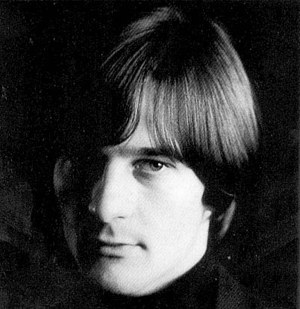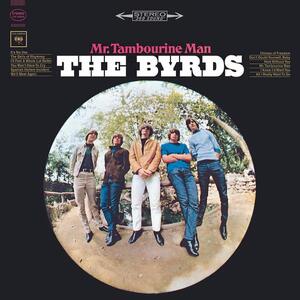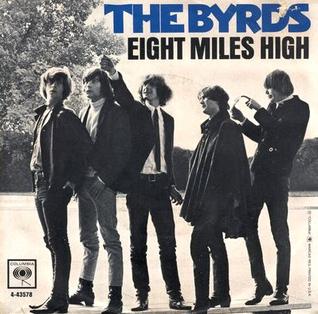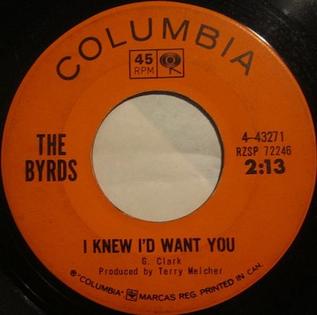
The Byrds were an American rock band formed in Los Angeles, California, in 1964. The band underwent multiple lineup changes throughout its existence, with frontman Roger McGuinn remaining the sole consistent member. Although their time as one of the most popular groups in the world only lasted for a short period in the mid-1960s, the Byrds are considered by critics to be among the most influential rock acts of their era. Their signature blend of clear harmony singing and McGuinn's jangly 12-string Rickenbacker guitar was "absorbed into the vocabulary of rock" and has continued to be influential.

"Mr. Tambourine Man" is a song written by Bob Dylan, released as the first track of the acoustic side of his March 1965 album Bringing It All Back Home. The song's popularity led to Dylan recording it live many times, and it has been included in multiple compilation albums. It has been translated into other languages and has been used or referenced in television shows, films, and books.

Harold Eugene Clark was an American singer-songwriter and founding member of the folk rock band the Byrds. He was the Byrds' principal songwriter between 1964 and early 1966, writing most of the band's best-known originals from this period, including "I'll Feel a Whole Lot Better", "She Don't Care About Time", "Eight Miles High" and "Set You Free This Time". Although he did not achieve commercial success as a solo artist, Clark was in the vanguard of popular music during much of his career, prefiguring developments in such disparate subgenres as psychedelic rock, baroque pop, newgrass, country rock, and alternative country. He was inducted into the Rock and Roll Hall of Fame in 1991 as a member of the Byrds.

Mr. Tambourine Man is the debut studio album by the American rock band the Byrds and was released on June 21, 1965, by Columbia Records. The album is characterized by the Byrds' signature sound of Jim McGuinn's 12-string Rickenbacker guitar and the band's complex harmony singing. The material on the album mostly consists of cover versions of folk songs, primarily composed by Bob Dylan, and originals written or co-written by singer Gene Clark. Along with the Dylan-penned single of the same name, Mr. Tambourine Man established the band as an internationally successful act and is widely regarded by critics as representing the first effective American challenge to the chart dominance of the Beatles and other British Invasion bands during the mid-1960s.

Turn! Turn! Turn! is the second studio album by American rock band the Byrds, released on December 6, 1965, by Columbia Records. Like its predecessor, Mr. Tambourine Man, the album epitomized the folk rock genre and continued the band's successful mix of vocal harmony and jangly twelve-string Rickenbacker guitar. The album's lead single and title track, "Turn! Turn! Turn!", which was adapted by Pete Seeger from text in the Book of Ecclesiastes, had previously been arranged in a chamber-folk style by the Byrd's lead guitarist Jim McGuinn for folk singer Judy Collins' third album, but the arrangement he used for the Byrds' recording of the song utilizes the same folk-rock style as the band's previous hit singles.

Fifth Dimension is the third album by the American rock band the Byrds and was released in July 1966 on Columbia Records. Most of the album was recorded following the February 1966 departure of the band's principal songwriter Gene Clark. In an attempt to compensate for Clark's absence, guitarists Jim McGuinn and David Crosby increased their songwriting output. In spite of this, the loss of Clark resulted in an album with four cover versions and an instrumental, which critics have described as "wildly uneven" and "awkward and scattered". However, it was the first Byrds album not to include any songs written by Bob Dylan, whose material had previously been a mainstay of the band's repertoire.

The Byrds' Greatest Hits is the first greatest hits album by the American rock band the Byrds and was released in August 1967 on Columbia Records. It is the top-selling album in the Byrds' catalogue and reached number 6 on the Billboard Top LPs chart, but failed to chart in the UK.

Byrds is the twelfth and final studio album by the American rock band the Byrds and was released in March 1973 on Asylum Records. It was recorded as the centerpiece of a reunion among the five original band members: Roger McGuinn, Gene Clark, David Crosby, Chris Hillman, and Michael Clarke. The last time that all five members had worked together as the Byrds was in 1966, prior to Clark's departure from the band. During the reunion, the current, latter-day lineup of the band continued to make live appearances until February 1973, with McGuinn being the only member common to both versions of the group.

The Byrds is a four-CD box set by the American rock band the Byrds. It features music that had previously been released between the mid-1960s and early 1970s, along with a number of previously unreleased tracks and some new recordings from 1990. The box set was issued on October 19, 1990, by Columbia/Legacy and reached number 151 on the Billboard albums chart.

"Eight Miles High" is a song by the American rock band the Byrds, written by Gene Clark, Jim McGuinn, and David Crosby. It was first released as a single on March 14, 1966. Musically influenced by sitar player Ravi Shankar and jazz saxophonist John Coltrane, the song was influential in developing the musical styles of psychedelia and raga rock. Accordingly, critics often cite "Eight Miles High" as being the first bona fide psychedelic rock song, as well as a classic of the counterculture era.

"It Won't Be Wrong" is a song by the American folk rock band the Byrds, which appeared as the second track on their 1965 album, Turn! Turn! Turn! It was also coupled with the song "Set You Free This Time" for a single release in 1966, resulting in "It Won't Be Wrong" charting at number 63 on the Billboard Hot 100. The song was written by Byrds band member Jim McGuinn and his friend Harvey Gerst in 1964.

The Byrds' Greatest Hits Volume II is the second greatest hits album by the American rock band the Byrds. It was released in the United Kingdom and Europe on October 29, 1971, by CBS Records as a follow-up to the band's first compilation album, The Byrds' Greatest Hits. The album appeared following the band's successful appearance at the Lincoln Folk Festival in England on July 24, 1971, and according to band biographer Johnny Rogan may have been issued by CBS as a reaction to the band's previous studio album, Byrdmaniax, having failed to chart in the UK.
"Full Circle Song" is a country rock-style song written by Gene Clark. For the lyrics, he used an allegorical wheel of fortune motif to comment on the unpredictable nature of fame and fortune. Recorded in Los Angeles in 1972, the song was originally released on Clark's Roadmaster, which was only issued in the Netherlands in January 1973.

Never Before is a compilation album by the American rock band the Byrds, consisting of previously unreleased outtakes, alternate versions, and rarities. It was initially released by Re-Flyte Records in December 1987 and was subsequently reissued on CD in 1989, with an additional seven bonus tracks.

McGuinn, Clark & Hillman were an American rock group consisting of Roger McGuinn, Gene Clark, and Chris Hillman, who were all former members of the band the Byrds. The group formed in 1977 and was partly modeled after Crosby, Stills, Nash & Young and, to a lesser extent, the Eagles. They were reasonably successful commercially in the United States, with their debut album reaching number 39 on the Billboard Top LPs & Tapes chart and the single "Don't You Write Her Off" reaching number 33 on the Billboard Hot 100.

"She Don't Care About Time" is a song by American folk rock band the Byrds. It was released on a non-album single in October 1965, as the B-side to "Turn! Turn! Turn!". The song was written by Gene Clark, the Byrds' main songwriter between 1964 and early 1966. "She Don't Care About Time" was recorded during sessions for the group's second album Turn! Turn! Turn!. The song is on most of the band's hits compilations.

"I Knew I'd Want You" is a song by the folk rock band the Byrds, written by band member Gene Clark, and first released as the B-side to their 1965 debut single, "Mr. Tambourine Man". It was also later included on their debut album, Mr. Tambourine Man.
"Here Without You" is a song written by Gene Clark that was first performed on the Byrds' 1965 debut album Mr. Tambourine Man. It was later covered by other artists, including Reigning Sound and Richard Thompson.
"If You're Gone" is a song written by Gene Clark that was first released on the Byrds' 1965 album Turn! Turn! Turn!.
"The World Turns All Around Her" is a song written by Gene Clark that was first recorded by the Byrds for their second album Turn! Turn! Turn! (1965).
















